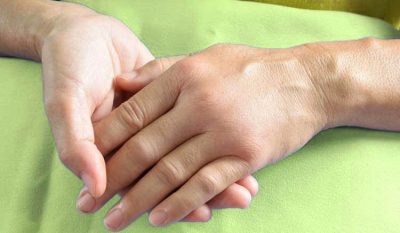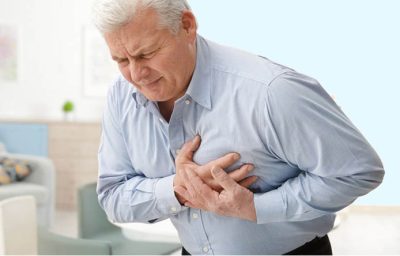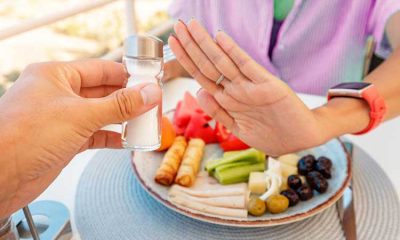What should we do if we eat salty food?

What should we do if we eat salty food?
What are the ways to quickly remove salt from the body?
Salt or sodium chloride is composed of about 40% sodium and 60% chloride. This salty condiment gives food a taste and is also used as a glue and stabilizer in the industry. It’s also a good preservative for foods, because bacteria can’t grow in the presence of salt.
The human body needs a small amount of sodium to guide nerve impulses, contraction and relaxation of muscles and maintain proper balance of water and minerals, but too much sodium in the diet is also harmful and can lead to high blood pressure, heart disease, stroke and loss of calcium in bones. In this paper, we will discuss the topics of rapid salt disposal, risks of eat salty food, sodium sources for the body and sodium table of some foods.
Dangers of consuming too much salt
Since there is insufficient evidence to determine the limit of salt in the diet or toxic levels of sodium (except for the risk of chronic diseases), the permissible level of tolerable for this food has not been determined. Studies say for men and women aged 14 and over and pregnant women, consumption of 1500 mg of salt per day is allowed and a dose of 2300 mg per day is suggested as the maximum salt intake to reduce chronic diseases.
buy blue salt and Pink salt powder at a Low price and the best quality.
Reducing sodium intake to less than this rate is expected to reduce the risk of chronic diseases in a healthy general population. Furthermore, in most people, the kidneys have difficulty keeping excess sodium in the blood, and by accumulating sodium in the blood, they increase the amount of fluid around the cells and the volume of blood in the veins.
Increased blood volume means more heart activity and more pressure on blood vessels. Over time, extra work and pressure can tighten blood vessels and lead to High blood pressure Heart attack or heart failure. Therefore, rapid disposal of salt is essential.
Short-term effects of high salt intake
Consuming too much salt in one serving or during the day can have the following short-term consequences.
Water retention
When water retention occurs, you may initially notice that you feel more bloated or bloated than usual because your kidneys want to maintain a certain sodium-to-water ratio in your body, and to do so, they retain extra water. To eliminate excess sodium from the body. This water retention may lead to swelling, especially in the hands and feet, and make you feel overweight.

Water retention in the body leads to swelling, especially in the hands and feet, causing overweight.
Increased blood pressure by not quickly excreting salt from the body
A meal high in salt can cause more blood flowing through the veins and temporarily increase blood pressure. Not everyone may experience these effects, of course. For example, research suggests that people who are resistant to salt may not experience an increase in blood pressure after consuming salty meals. it is thought that a person’s sensitivity to salt, Influenced by factors such as genetics and hormones located.
Extreme thirst with no rapid excretion of salt
Consuming a salty meal can cause dry mouth or a strong thirst, and the body tries to correct the sodium-to-water ratio by encouraging a person to drink water. On the other hand, not consuming fluids after eating large amounts of salt may cause the body’s sodium levels to rise above safe levels, resulting in a condition called Hypernatremia create.
Hypernatremia can cause water to be removed from the body’s cells and inserted into the blood to quickly excrete salt from the body. If left untreated, this fluid displacement can lead to confusion, seizures, coma and even death. Other symptoms of Hypernatremia, including Restlessness, respiratory problems and sleeping and decreased urine Is.
Sources of sodium for the body
Sodium is generally not a nutrient, but in almost every unprocessed foodstuff such as fruits, vegetables, Whole Grains, there are nuts, meat and dairy foods. Most salt from fast foods enters the diet, not from salt added to the cooking food or even from the salt left in the table before meals. The main sources of sodium in our diet are:
- Bread
- Pizza
- Sandwich
- Cold Foods
- Cooked meat
- Ready-made soup and Instant Noodles
- Snacks (chips, puffs, popcorn, pretzels, crackers)
- Chicken
- Cheese
- Eggs
- Canned
Rapid removal of salt from the body and long-term effects of high salt consumption
Consuming too much salt over a long period of time may cause the following problems.
Increased blood pressure
In this part of the article on the rapid disposal of salt from the body, research shows that salty diets significantly increase blood pressure and reducing salt content in people’s diets can help reduce their blood pressure levels.
Increased risk of stomach cancer
Several studies have linked a high-cut diet with a higher risk of developing stomach cancer. A survey of more than 268,000 participants suggests that people with an average salt intake of 3 grams per day may be up to 68 percent more at risk of developing gastric cancer than those with an average salt intake of about 1 gram per day. Experts believe high-cut diets may make a person more vulnerable to stomach cancer by causing ulcers or inflammation of the stomach mucosa.
The possibility of heart disease and early death due to the lack of rapid elimination of salt from the body
The link between salt-rich diets, heart disease and premature death is still somewhat controversial. Some studies have shown that high salt intake increases blood pressure and tightens the veins and arteries. These changes may lead to a higher risk of heart disease and premature death.
However, some other studies suggest that high-salt diets have no effect on heart health or longevity, and are low-salt diets that increase the risk of heart disease and death! Other long-term effects of excessive sodium in the diet include::
- Enlargement of the heart muscle
- Headaches
- Heart failure
- Kidney disease
- Kidney stones
- Osteoporosis
- Gastric Cancer
- Stroke
Ways to remove excess sodium from the body
Keeping sodium levels balanced helps keep the body healthy, but a minor mistake can also cause a bad feeling. If you feel bloated after eating a food high in sodium, these tips help you feel light.
Drinking water
Drinking water helps the body in many ways. Drinking water when puffing may not seem like a good idea, but it helps to get salt out of your body.
Potassium consumption
You can use supplements, but consuming foods high in potassium naturally lowers sodium levels. Eat some bananas and potatoes, or vegetables with green leaves. Coriander, garlic, pineapple, oregano, artichokes and strawberries are great options for warding off sodium from the body.
Increased mobility
Even if you’re not feeling very well, aerobic exercise is the best defense against this letharge. Whether you go to the gym or run on the sidewalk, you will definitely feel better after exercising. If you’re lucky and have access to a sauna or steam room, it helps a lot to ward off toxins and impurities through sweating.
Reduce salt intake
Make sure to lower your salt intake as low as possible in the coming days. Focus on healthy eating, completely natural foods, especially fresh fruit and vegetables. Don’t pour salt on food when eating and use low-sodium snacks during the day.
Reduce the amount of sodium in the body
Sodium chloride, commonly called culinary salt, is essential for our bodies. But high salt intake can damage the body in different ways over time. However, not everyone is equally sensitive to high levels of salt. Researchers have long believed that how to control salt levels in our bodies is quite simple.
When the level is too high, our brains are stimulated to make us thirsty. We drink more water and excrete more urine through which excess body salt is excreted. Changing salt intake affects levels of aldosterone and glucocorticoids (hormones that rhythmically control the balance of salt and dehydration).
As a result of increased salt intake, it increases sodium excretion, but unexpectedly causes it to store all water. Therefore, excess sodium is released in concentrated urine. This protective method is very effective against the rapid disposal of salt from the body.
On the other hand, researchers found that the kidney stores or releases water by balancing levels of sodium, potassium and urea, and associates glucocorticoid levels with salt intake. A high-cut diet increases the level of glucocorticoids, causing muscles and liver to burn more energy to produce urea, which is used in the kidneys to conserve water.
Signs of high salt in the body
Our bodies only need a small amount of sodium. with the help of the following symptoms, we can find that we have consumed too many salts.
Bloating
Bloating or swelling and stiffness of the stomach is one of the most common short-term side effects of high salt intake. In fact, bloating helps the body conserve water. Therefore, it causes fluid retention in the body. Sandwiches, pizzas, confectionery and canned goods can be added sodium sources.
High blood pressure
Changes in blood pressure occur through the kidneys. The presence of too much salt in the body makes it difficult to quickly excrete salt from the body, resulting in high blood pressure.
Swelling of the body
Swelling in the face, hands and ankles Can be a sign of excessive sodium in the body.
A lot of thirst
Excessive thirst can be a sign of excessive salt in the body, which causes dehydration. The body tries to compensate for the state of sodium imbalance by drawing water from the cells. Drinking water can help dilute sodium and refresh the body’s cells.
High thirst can be a sign of excessive salt in the body, which causes dehydration.
Frequent urination
Salt can Causes a lot of thirst and encourages drinking water The result is constant visits to the toilet and frequent urination.
Sleep disorders
Salt intake before bedtime can lead to sleep disturbances. Symptoms of the disorder can range from restlessness in sleep, to waking up in the middle of the night and feeling lacking sleep in the morning.
Weight gain
Water retention in the body may lead to rapid weight gain. That way, if you go on the scales shortly after high sodium intake, you’ll see that you’ve gained weight. However, this overweight continues for a little while and is resolved by itself. but over time it affects your overall weight level.
Feeling weak
When there is too many salts in the blood, the water goes out of the body’s cells to dilute the salt. As a result, the person may suddenly feel weak.
Stomach discomfort
If too much salt in the diet causes dehydration, the stomach will feel it. Its symptoms also feel nausea, diarrhea, upset stomach or cramps. Drinking plenty of water helps fix this problem.
Table of sodium content in foods
In the following article, rapid disposal of salt from the body, sodium in different foods has been shown. You can refer to the table below to find out the amount of salt in different foods:
| Foodstuff | Weight | Sodium content |
| Apple juice | 248 | 7 |
| Carbonated soft drink without caffeine | 355 | 75 |
| Carbonated soft drink with caffeine | 370 | 15 |
| espresso coffee | 60 | 8 |
| Coffee made with water | 178 | 4 |
| grape juice | 250 | 5 |
| Grapefruit juice | 250 | 5 |
| Vanilla milkshake | 313 | 297 |
| chocolate milk | 250 | 153 |
| low-fat milk | 244 | 124 |
| skimmed milk | 245 | 127 |
| Orange juice | 249 | 2 |
| soy milk | 245 | 29 |
| Tea | 178 | 5 |
| tomato paste | 243 | 877 |
| salted butter | 14.2 | 117 |
| unsalted butter | 14.2 | 2 |
| cheese sauce | 243 | 1,198 |
| Cheddar cheese | 28.35 | 176 |
| cottage cheese | 210 | 851 |
| cream cheese | 14.5 | 43 |
| feta cheese | 28.35 | 316 |
| mozzarella cheese | 28.35 | 150 |
| Parmesan cheese | 5 | 93 |
| cream | 15 | 6 |
The following spices and flavors have little sodium and can be a good substitute for salt and enhance the taste of foods as well:
- Laurel
- Curries
- Dried mustard
- Fruits such as oranges, lemons
- Raisins
- Garlic
- Ginger
- Plants such as basil, mint, scallions or tarragon
- Onions
- Chili Pepper
- Jafari
- Pepper
- Rosemary
- Tomatoes
- Sugar (small)
Excessive consumption of salt can have different effects. salt in the short term, may cause Bloating Severe thirst and temporary increase in blood pressure, and in severe cases, lead to hypernatremia, which can be fatal if left untreated. In the long run, high-yield diets can increase blood pressure and risk of stomach cancer, heart disease and premature death
Some people may be affected by consuming too much salt earlier than others. To compensate for a salty meal and quickly excrete salt from the body, try drinking more water, eating potassium-rich foods and reducing your salt intake in other meals. Using some spices and flavors instead of salt is also a good alternative to body health.
Source: + / + / + / + / + / Bitly / Cuttly







